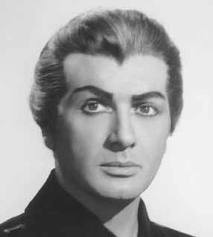One of my favorite opera-going moments: When Franco Corelli started an aria facing the back of the stage.
 Of course you’re never supposed to do that. You always face forward in your big moments, partly because you don’t want to eclipse yourself theatrically, but also to make sure your voice is heard.
Of course you’re never supposed to do that. You always face forward in your big moments, partly because you don’t want to eclipse yourself theatrically, but also to make sure your voice is heard.
But Corelli, or so it seemed, didn’t see it that way. He was singing the tenor lead in La gioconda at the Met, maybe in the ’70s. The opera calls for him to sing his big aria, “Cielo e mar,” alone on stage. “Cielo e mar,” he sings. Meaning “sky and sea.”
So I can imagine him thinking something like this: “I sing about the sky and the sea. Where are the sky and sea? They are at the back of the stage. So I will turn to the back and face them.”
Crazy. Except that Corelli had a huge voice, and also was a huge presence — handsome, tall, committed 1000% to his performances — on stage. It helped, too, that those first words are unaccompanied. We hear only Corelli. The orchestra doesn’t play.
And so Corelli, with his back to the audience, even singing quietly, filled the huge opera house. He commanded complete attention. You could say that his conception of acting was naive. You could say (and you’d be right) that this was something no other singer should ever dare to try.
And yet it was riveting.
***
Here’s a live performance from the Met in the 1960s, Corelli singing “Cielo e mar” in a warts and all recording that starts before the aria, as Corelli’s character says good night to sailors he commands. You’ll hear the voice of the prompter, feeding Corelli each of his lines (as all singers at all major opera houses to this day have them fed). You’ll hear Corelli doing some risky, sometimes rough, volcanic singing, in a style that — and this thrills me — isn’t in any way classical music. He sings as if he’d written the aria himself, or as if he’d learned it both in the opera house and on the street, and felt no obligation to sing with any restraint. For which he’s greeted with an ovation almost two minutes long, also unrestrained, of a kind I’ve never heard in any opera house in any recent year. You might not like this performance. I love it.
If you want something that’s weird, but musically more polished, here Corelli is in a video, apparently lipsyncing to his terrific commercial recording of the aria. Not rough at all vocally, quite thrilling throughout, and the visuals — though utterly weird — give some idea of why he was so hard to resist onstage.
